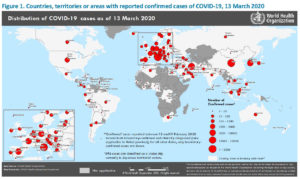 As a whirlwind of headlines came crashing in this week, each one seemingly worse than the last, we woke up to a scary new normal. Even if COVID-19 doesn’t affect you directly, the economic fallout of the disease is about to reach out and touch everyone. After a week that gave us the new euphemism “social distancing,” there is no more “business as usual,” at least for the foreseeable future.
As a whirlwind of headlines came crashing in this week, each one seemingly worse than the last, we woke up to a scary new normal. Even if COVID-19 doesn’t affect you directly, the economic fallout of the disease is about to reach out and touch everyone. After a week that gave us the new euphemism “social distancing,” there is no more “business as usual,” at least for the foreseeable future.
As this disastrous week winds down, with a Friday the 13th no less, it’s difficult to assess the full impact that coronavirus will have on the film, TV and commercial production industries. The dust won’t even settle on this for a long time. But it won’t be pretty. There will be blood. With many in the industry operating on thin margins, it’s an industry that’s particularly vulnerable to production delays and cash flow crises.
“Thousands of our members are facing financial hardship as a result of recent cancellations,” said Jonas Loeb, IATSE director of communications. “We are actively investigating all possible courses of action that can help ensure the financial stability of members who lose work as a result of the COVID-19 virus. That includes talks with employers across every sector of the entertainment industry. We are also reviewing all of our contracts for any pertinent provisions (i.e. Force Maejure).”
Since it first surfaced in China in late December 2019, COVID-19 has alarmed the medical community with its rapid rate of growth, long infectious period and relatively high mortality rate. Of course, there are other diseases that have a much higher mortality rate, but they don’t spread as easily, or they impact you so quickly that you don’t have a chance to spread it around before you seek medical attention. There are others that spread more easily, but just aren’t as lethal. But COVID-19 is hitting a certain “sweet spot” in that equation that makes it a very dangerous pathogen.
At press time, there were more than 133,000 cases of coronavirus in 122 countries that have caused more than 5,000 deaths. The disease had spread to 49 states with more than 2,384 U.S. cases and 51 deaths.
Although Chinese officials were criticized for their initial response, (trying to suppress information about the disease), when they realized the gravity of the situation, they reacted with strict quarantine measures that helped curb its rate of growth.
China’s box office generated $9.3 billion in 2019, second only to the U.S. and Canada with $11.4 billion. In fact, China was expected to surpass the North American market this year, but in late January, the country closed almost all movie theaters, and it’s still not clear when they might re-open. As of the beginning of March, the box office losses from China alone were estimated at around $2 billion.
This week, the U.S. started to wake up and realize the gravity of the situation. At the beginning of the week the impact of the disease seemed pretty muted, at least on the production industry. Mission Impossible 7, which had been scheduled to shoot in Italy, had to postpone production while they scouted out alternative locations. MGM postponed the release of its upcoming James Bond flick No Time to Die from April 10 to Nov. 25. (All told, that’s not so bad).
In terms of television, producers of shows shot in front of a live studio audience, like Jeopardy and Wheel of Fortune, shot in Culver City, as well as Dr. Phil shot at Paramount Studios announced early in the week that they would drop the live audience temporarily, “out of an abundance of caution.” ABC shows shot in New York like LIVE with Kelly and Ryan, The Tameron Hall Show and The View, quickly followed suit. The Wendy Williams Show, broadcast on Fox, announced a similar change on Tuesday.
 The big bombshells started hitting Wednesday morning. First, Tedros Adhanom Ghebreyesus, director-general of the World Health Organization (WHO) used a word that they’ve been carefully avoiding until now, declaring this a “pandemic.”
The big bombshells started hitting Wednesday morning. First, Tedros Adhanom Ghebreyesus, director-general of the World Health Organization (WHO) used a word that they’ve been carefully avoiding until now, declaring this a “pandemic.”
“Pandemic is not a word to use lightly or carelessly,” he said. “It is a word that, if misused, can cause unreasonable fear, or unjustified acceptance that the fight is over, leading to unnecessary suffering and death.”
Meanwhile, Dr. Anthony Fauci, director of the National Institute of Allergy and Infectious Diseases testified before a U.S. House Oversight Committee. “The bottom line it’s going to get worse…” he said. “It is critical because we must be much more serious as a county about what we might expect… A couple of cases today are going to be many, many cases tomorrow.”

Shortly after that, the National Association of Broadcasters (NAB) president and CEO Gordon Smith announced that the association was cancelling its annual NAB trade show in light of COVID-19 concerns. The event, slated for April 18-22 in Las Vegas, drew more than 90,000 attendees last year from 160 countries with more than 1,600 exhibitors. The show was estimated to bring $153.3 million to the Las Vegas hospitality industry alone and the Las Vegas Convention and Visitors Authority ranks it as the city’s fourth largest convention.
While the show organizers say that they’re looking at other alternatives, it’s hard to imagine how they could reschedule such a massive event, with so many moving parts, especially when we have no idea when COVID-19 might start to die down.
Countless other trade shows and events have had to make the same difficult decision. The financial impact on the $2.5 trillion-dollar global trade show industry has yet be calculated, but other recent cancelations include Mobile World Congress in Barcelona, (Feb. 24-27); SXSW in Austin, Texas (March 13-22); The Game Developers Conference in San Francisco (March 16-20); MIPTV in Cannes (March 30-April 2); FMX in Stuttgart, Germany (May 5-8), and E3 in Los Angeles (June 9-11). AFCI Week has been postponed to June 22-26
Countless other corporate events have also been called off, including Avid Connect 2020, (which was scheduled to coincide with NAB), Nvidia’s GTC, Google Cloud Next, the Adobe Summit & Magento Imagine Digital Experience Conference and the F8 Facebook Developers Conference. Some of them are looking at online alternative “virtual conferences” to suit their needs, but no one has figured out how to hold a “virtual trade show” that could compare to NAB.

The next big bombshell came when the National Basketball Association (NBA) abruptly suspended the rest of its season after Utah Jazz center Rudy Gobert tested positive for the virus. The NCAA also canceled March Madness.
The National Hockey League announced Thursday that, since hockey players share so many facilities and locker rooms with basketball players, it was “pausing” the season. Major League Baseball (MLB) followed suit delaying this year’s season openings for at least two weeks, and cancelling Spring Training games in Florida and Arizona. Major League Soccer (MLS) suspended games for 30 days.
NASCAR and IndyCar both cancelled races this weekend. IndyCar suspended its season through the end of April.
The PGA Tour has also cancelled its next four events, just days after signing nine-year deals for broadcast and streaming rights worth $700 million a year, up from about $400 million in the previous round.
Therein lies the rub. Broadcasters and cable networks pay exorbitant fees for the rights to carry popular sporting events. In turn, advertisers are willing to pay top dollar to reach those engaged, enthusiastic audiences. It’s a cash cow for the broadcasters and cable networks that helps subsidize the rest of their operations, from local news to comedies.
Sports also drives the demand for fresh new creative from the commercial production industry, with the Super Bowl commanding the top dollar/second in the annual calendar. Indeed, the commercial production houses have a lot to lose now. Advertisers spent more than $70 billion on TV ads last year.
Broadcasters are now nervously watching the COVID-19 situation in Japan. The entire broadcast industry has evolved around a quadrennial cycle where every four years, they can expect a major influx of cash from The Olympics and the U.S. elections. If the Summer Olympics in Tokyo, July 24-Aug. 9 are impacted, they will never be able to make up that money and it will impact their financial plans for the next four years.
Another ripple effect to keep an eye on is that access to live sports is one of the key reasons people still pay for expensive cable or satellite TV subscriptions, rather than a host of cheaper streaming alternatives that don’t include live sports programming.
Last week, Craig Huber, CEO and managing director of brokerage Huber Research Partners told FOX Business that coronavirus could be good for streaming media companies. “If this coronavirus issue picks up steam a lot more than it has already and a lot of people aren’t leaving their homes or are fearful to leave their homes, it may be more likely to buy an over-the-top media subscription… like Netflix or a Disney+ or what have you,” he said. “If you’re trapped at home, you probably watch more television. And it might lead to more OTT signups, digital signups and stuff.”
But earlier this week, Needham analyst Laura Martin dismissed that theory, arguing that with its flat-rate, no-advertising business model, Netflix doesn’t stand to make any more money if viewers spend more time binge watching. Plus, analysts are saying that Netflix has already saturated the market, so, at best, it’s a wash.
What does compel new subscribers to sign up is new original content. Disney+ proved this with its wildly popular series The Mandalorian, which helped sell the service to almost 30 million subscribers in its first quarter. But it’s those new productions that are most at risk now.

On Wednesday, President Donald Trump announced an unprecedent travel ban on 26 European countries for 30 days, which is likely to wreak havoc with film and TV schedules around the world.
From feature films, to streaming productions to TV and commercial production, by its nature it’s an industry that moves around a lot. And with a bohemian vagabond workforce, tightly scheduled between one gig and the next, production delays can be disastrous. Postponing production can often mean that a show never gets finished.
It’s just not an industry where you can work from home.
Hair, makeup and costume departments have to get up-close-and-personal with the talent, while crew are running around set all day handling equipment, setting it up, adjusting it and tearing it down – from lights to keyboards and consoles, to mics and earphones, to cameras and props; It’s a very tactile process that puts people from all over the world in close quarters – exactly what the medical community is advising against right now.
Even in postproduction, people share keyboards and consoles throughout the day, often working in close contact with other creatives for prolonged periods of time.
But before Wednesday was finished bashing us around, as if to add insult to injury, we got news that beloved Hollywood star Tom Hanks and his wife Rita Wilson tested positive for the disease. The couple were in Australia doing preproduction work for an untitled Warner Bros. biopic about Elvis Presley directed by Baz Lurhmann. Needless to say, work has ground to a halt.
Then of course, Thursday saw the S&P 500 plummet 9.51% making for the worst stock market decline since Oct. 19, 1987 when the S&P 500 lost 20.47%. Daycares, schools, universities, and just about any public gathering started closing down, and the production cancellations and delays started pouring in.
On Thursday, Netflix shut down its scripted TV and movie productions in the U.S. and Canada for two weeks, impacting some 35 shows, including the fourth season of Stranger Things along with others that had been previously announced like Ryan Murphy‘s film The Prom and the final season of Grace and Frankie.
Disney+ shut down production of an upcoming Falcon And Winter Soldier Marvel Cinematic Universe series that was scheduled to shoot in Prague and recalled the crew to Atlanta. The six-episode series was slated for release on the new streaming platform in August.
CBS TV Studios stopped production on NCIS, NCIS: Los Angeles, NCIS: New Orleans, Bull, Dynasty and The Good Fight.
Doom Patrol which shoots in Atlanta for the Warner Bros.-owned streaming channel DC Universe, also shut down abruptly. In fact, we’re getting reports from Atlanta that pretty much every production is shut down as of Monday.
Grey’s Anatomy also shut down production yesterday for at least two weeks.
On Friday, Warner Bros. Television Group announced they were halting production on more than 70 series and pilots currently filming or about to begin. Disney TV Studios shut down 16 pilots.
FX Productions is also postponing production on shows like Snowfall, Atlanta, Fargo and new series Y: The Last Man.
Meanwhile, late-night shows, including The Tonight Show Starring Jimmy Fallon and Late Night with Seth Meyers suspended production starting Friday night. HBO’s Real Time With Bill Maher suspended production Thursday and Last Week Tonight will suspend production after tonight’s episode.
Comedy Central’s late-night series The Daily Show and Lights Out With David Spade are also suspending production for two weeks starting March 16. The Ellen DeGeneres Show is another major shut down.
Riverdale, which airs on the CW network suspended production in Vancouver after a team member was reported to have had contact with someone who tested positive for the disease. The CW’s Warner Bros. TV-produced DC Comics drama The Flash, which is also shot in Vancouver for the CW network is also shut down.
The list goes on and on. At this point, just about every major show has at least taken a hiatus. At the moment, it takes a man-bites-dog story to stand out. “What shows are still shooting?” will be the question next week.
As the week wound down, President Trump declared a state of emergency, freeing up $50 billion in emergency funds and activating FEMA.
By Friday, companies had stopped patting themselves on the back for their “abundance of caution” in taking these steps and started to admit that they had no choice. Of course, “had no choice” sounds a lot better than “abundance of caution” to the completion bond financers and insurance companies who are nervously watching this from the sidelines.
It’s interesting to note that most of the production delays and postponed sporting events seem to be limited to two weeks. The idea of a 14-day “quarantine period” has made its mark on our psyche. There’s also a certain expectation that this could all die down in the summer months. So, if we can just hold our breaths for two weeks and make it to April, it should start to reside.
Unfortunately, that may not be the case. There is no indication the disease will die down in the warmer months, and after two weeks in isolation, we could all come back, bleary-eyed and groggy from our two-week Netflix binge to a much different world, and the disease could come roaring back with it.
Publisher’s Note:
This is our first full accounting and reporting of the direct effects of the COVID-19 pandemic on the entertainment industry.
First, but sadly not to be our last story on the matter. We’ll update and extend the story in the days and weeks to follow.
Any specific news to report, please keep us informed:
- [email protected] – heavily monitored. Please put ‘COVID’ in the subject line so it jumps out
- [email protected] – Scott Lehane, Writer
- [email protected] – Patrick Graham, Publisher
- [email protected] – Associate Editor Olivia Gleichauf
Don’t hoard. Don’t panic. Take care of your Brothers and Sisters, kith and kin.
Patrick Graham
Publisher
Below the Line





